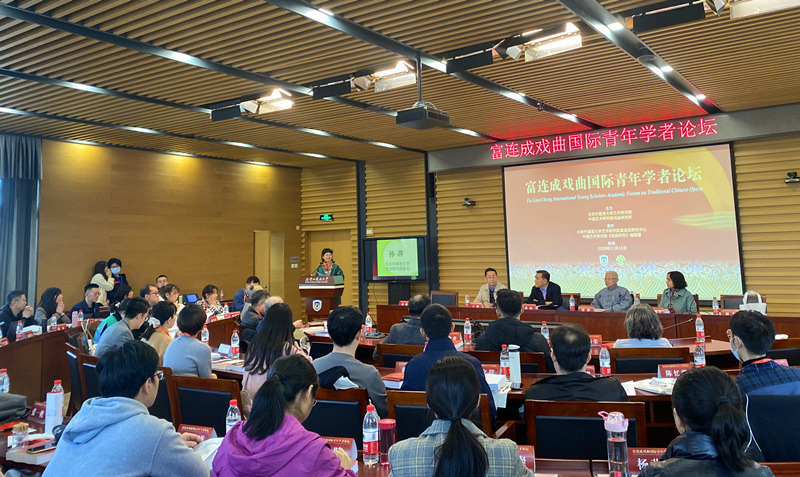Forum focuses on legendary Peking Opera school
- By Zhang Rui
 0 Comment(s)
0 Comment(s) Print
Print E-mail China.org.cn, November 18, 2020
E-mail China.org.cn, November 18, 2020

An academic forum on China's first Peking Opera school and its historic values, as well as research into traditional Chinese opera, was held in Beijing on Sunday.
The first Fu Lian Cheng International Young Scholars Academic Forum on Traditional Chinese Opera was co-sponsored by the Art Research School of Beijing Foreign Studies University (BFSU) and the Institute of Traditional Chinese Operas of Chinese National Academy of Arts, and co-organized by the Research Institute of the Fu Lian Cheng Troupe and Studies on Traditional Chinese Operas magazine.
The forum was designed to explore and examine the historic contributions, legacy and influence of the Fu Lian Cheng Troupe, deemed as the first Peking Opera school in history, set up in 1904 by the Peking Opera educator and performing master Ye Chunshan.
The troupe carried on for 44 years, nurturing more than 700 students, including Lei Xifu and Tan Fuying, many of whom became artistic masters and educators. Even Mei Lanfang, the most renowned Peking Opera master of all, took some lessons and practiced his routines with the troupe.
Nearly 100 scholars from various universities, research institutes and opera troupes in China, attended the forum.
Professor Sun Ping, a female Peking Opera master and dean and doctoral tutor of the Art Research School of BFSU, reviewed the rich history and research results of the Fu Lian Cheng Troupe, pointing out its important position in the history of Chinese opera education. On the basis of fully affirming the research results of young scholars, she made several suggestions for the research of Fu Lian Cheng.
"Fu Lian Cheng Troupe is the Peking Opera education institution with the longest running time, which trained the most talented people of the times and has had the most far-reaching influence in the history of Peking Opera," Sun said.
"Its graduates are widely distributed throughout the country and even overseas. They have been the backbone of the survival, development, and spread of Peking Opera for nearly a hundred years."
She added that it is particularly worth mentioning that Fu Lian Cheng's graduates played an "extremely important role" in the development and popularization of Peking Opera in Taiwan province and made indelible contributions to building a common cultural bond between the two sides of the [Taiwan] Strait. Sun believed scholars would find cultural confidence by studying Fu Lian Cheng.
The forum set up five research directions: Fu Lian Cheng and the Chinese Operas Education Research, Fu Lian Cheng and Peking Opera History, Fu Lian Cheng Artist's Interviews, Fu Lian Cheng Literature Research, and Fu Lian Cheng and Peking Opera Inheritance and Development. It received 50 high-quality academic papers from home and abroad, according to Sun.
Professor Niu Biao, 87, former vice president of the National Academy of Chinese Theatre Arts and also historian and educator of Chinese operas, gave a keynote speech in which he said that he believed China possessed the largest opera education and research sector with more opera professionals than anywhere in the world, though it still needed more investments.
"We had generations working to build up our opera cultures and nurturing a massive audience for traditional opera, and we are an eastern power holding the strongest position in the world in terms of opera business," he said.
Niu believed Fu Lian Cheng's elites jointly promoted Peking Opera to become the quintessence of the country. The opera form, taking shape 180 years ago, was included in UNESCO's World Intangible Cultural Heritage List in 2010, which, he said, showed its art had been recognized by the world.
"Its reputation spans time and space, transcends nationalities, and has contemporary value. Peking Opera has become an indispensable part of traditional Chinese culture, with generations of artists' hard works," he noted.
The veteran master suggested various measures to attract younger people to opera theaters, such as setting a low ticket price. He also helped the Ministry of Education to compile textbooks to guide students to appreciate Peking Opera.
Later, several young scholars also spoke at the forum. With Fu Lian Cheng and Peking Opera as the theme, they also deeply discussed traditional and modern opera education and research, reviewing the past, present and future of the art form, as well as exploring the talents training, opera creations, and the ecological environment for operas.






Go to Forum >>0 Comment(s)